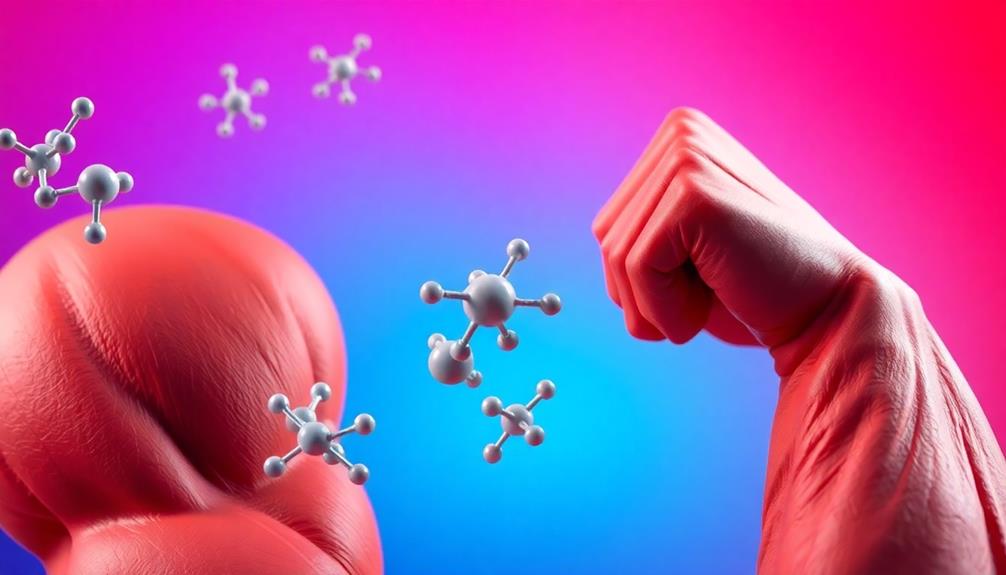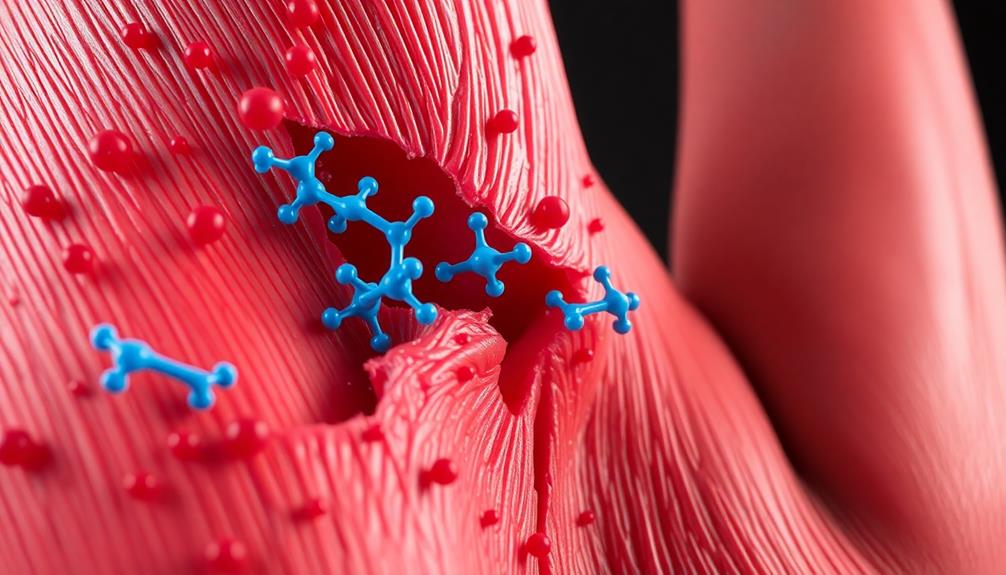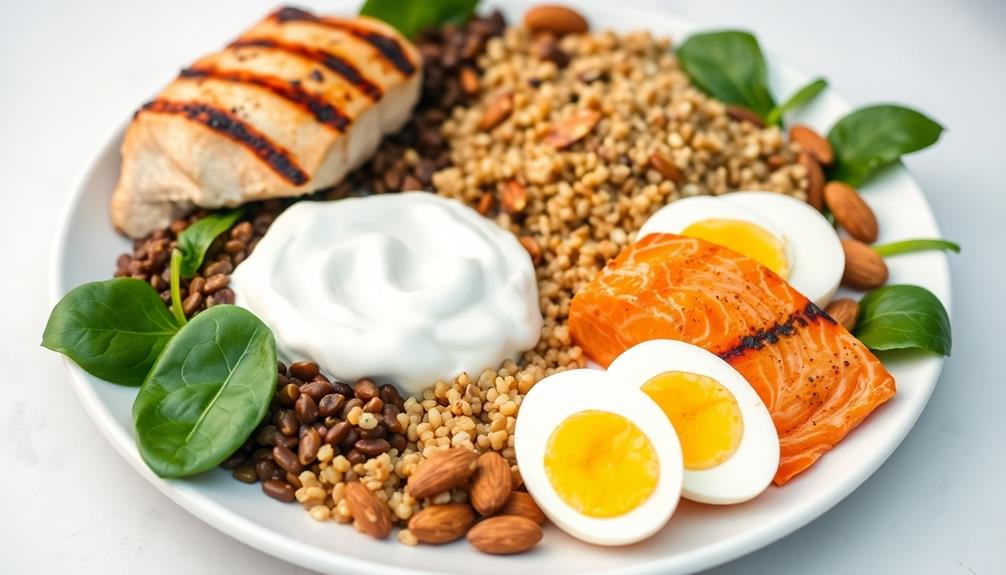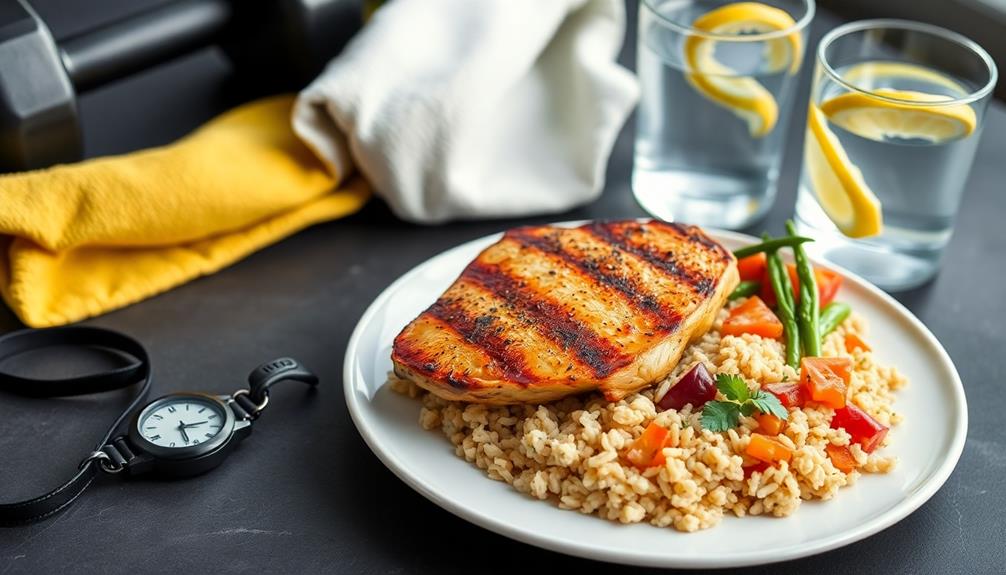To optimize protein and carb intake for effective muscle recovery, focus on timing and balance. Consume a mix of protein and carbs within 30 minutes to 2 hours after your workout. Aim for 2-3 grams of carbs for every gram of protein. Choose fast-acting carbs to quickly replenish glycogen stores, and lean protein sources to provide essential amino acids for muscle repair. Spread your protein intake throughout the day for continuous muscle support. Remember to adjust your ratios based on your individual goals and exercise intensity. By fine-tuning your nutrient intake, you'll enhance your body's ability to recover and grow stronger.
Core Insight
- Consume 2-3 grams of carbs for every gram of protein to support muscle recovery and glycogen replenishment.
- Eat protein and carbs within 30 minutes to 2 hours post-workout for optimal muscle repair and growth.
- Include fast-acting carbs immediately after exercise to quickly restore energy levels and aid recovery.
- Spread protein intake evenly throughout the day to maintain consistent muscle repair and growth.
- Adjust macronutrient ratios based on individual goals, exercise intensity, and body weight for personalized recovery.
Understanding Muscle Recovery Basics

When it comes to muscle recovery, it's important to know the basics. After a tough workout, your muscles get tiny injuries that make them sore and tired. Recovery is when your body fixes this damage and makes your muscles stronger. Electrolyte gummies can help you stay hydrated and keep your electrolytes in check, which is good for your muscles.
To recover well, your body needs the right nutrients, especially protein and carbs. Protein helps repair your muscles, while carbs give you energy and support recovery.
Rest is also key because it gives your body time to heal and get stronger. This means getting enough sleep and doing easier activities between workouts. Drinking plenty of water is important, too. It helps get rid of waste and brings nutrients to your muscles.
Protein's Role in Muscle Repair

Protein helps your muscles recover and grow after a workout. When you exercise, your muscles get tiny tears. Protein gives your body the building blocks it needs to fix these tears and make your muscles stronger.
Eating protein after exercise is important. It helps your body make new muscle. Good protein sources include lean meats, fish, eggs, beans, and lentils. Try to eat protein within 30 minutes to 2 hours after your workout for the best results.
Carbohydrates and Energy Replenishment

Carbohydrates are your body's main fuel source when you exercise. Intense physical activity drains your muscles' glycogen stores, which they need for energy. To fill these stores back up and help your muscles recover, it's important to eat carbohydrates after your workout. Quick-acting carbs in powder form work well for fast energy recovery.
Try to eat carbs within 30 minutes after exercising, when your muscles absorb nutrients best. Go for fast-digesting carbs like fruit, white rice, or sports drinks to quickly restore glycogen. For longer recovery, eat complex carbs like whole grains and sweet potatoes later on.
How many carbs you need depends on your weight and how hard you exercised. A rough guide is to eat 0.5-0.7 grams of carbs per pound of body weight in the two hours after working out.
Optimal Macronutrient Ratios

The right balance of protein, carbs, and fat after a workout is key for muscle recovery and growth. A good rule of thumb is to eat 2-3 grams of carbs for every gram of protein. So if you're having 25 grams of protein, aim for 50-75 grams of carbs to go with it. This combo helps restock your energy stores and gives your muscles the building blocks they need to repair themselves.
When it comes to carbs, fast-acting options that are easy to digest work best. They quickly replace the glycogen you used up during exercise. And don't skimp on healthy fats – they should make up about 20-30% of the calories you eat. Fats play a big role in hormone production and help your body absorb nutrients.
Keep in mind, these ratios aren't one-size-fits-all. Feel free to tweak them based on your goals and how your body responds. The key is to experiment and find what works best for you.
Timing Your Nutrient Intake

When you eat is just as important as what you eat for optimal muscle recovery. Protein and carbs should be consumed both before and after your workout. Fast-digesting carbs are great for quickly restoring energy and glycogen levels after exercising.
2-3 hours before your workout, eat a balanced meal with protein and carbs. This fuels your body and protects your muscles during exercise.
Within 30 minutes post-workout, have a snack rich in protein and carbs. This kicks off recovery and replenishes used up glycogen.
Spread your protein intake evenly across the day through meals and snacks. This ensures your muscles have a constant supply of amino acids for repair and growth.
At bedtime, consider eating a slow-digesting protein like casein to promote muscle recovery while you sleep.
Quality Sources of Protein

Quality protein is important for building and repairing muscle. The best protein sources have all the essential amino acids your body needs. These "complete" proteins include:
- Animal sources: chicken, fish, lean meats, eggs
- Plant sources: soy, quinoa, edamame
- Dairy: Greek yogurt, cottage cheese, whey, casein
Animal Protein:
- Chicken
- Salmon
- Lean beef
- Eggs
Plant Protein:
- Quinoa
- Lentils
- Tofu
- Edamame
Dairy Protein:
- Greek yogurt
- Cottage cheese
- Whey protein
- Casein protein
Mix up your protein sources to get a good variety of nutrients. Choose proteins that are easy to digest and packed with other key vitamins and minerals. Make sure to pick options that fit your diet and taste preferences too. Getting high-quality protein consistently will help your muscles recover and grow stronger.
Balancing Carbs for Performance

Balancing carbs is key for top performance in your workouts. To do this right, pay attention to when you eat carbs and choose high-quality sources. Eat complex carbs before exercising for long-lasting energy. After your workout, go for simple carbs to quickly refill your body's energy stores. Carb powders that absorb fast work great for recovery after training.
Throughout the day, get your carbs from whole grains, fruits, and veggies. These give you important nutrients and fiber too. When you're training hard, you need more carbs to keep your energy up. A good rule of thumb is 3-5 grams of carbs per kilogram of body weight each day if you're moderately active. For high-intensity training, aim for 5-7 grams per kilogram. Tweak this based on what works best for you and your performance goals.
Frequently Asked Questions
How Does Age Affect Protein and Carb Requirements for Muscle Recovery?
As you age, you'll need more protein and fewer carbs for muscle recovery. Your metabolism slows down, so you'll require extra protein to maintain muscle mass. Adjust your intake based on your activity level and goals.
Can Plant-Based Proteins Be as Effective for Muscle Recovery as Animal Proteins?
Yes, plant-based proteins can be as efficient as animal proteins for muscle recovery. You'll need to make sure you're consuming a variety of plant sources to get all essential amino acids. Combine legumes, grains, nuts, and seeds for best results.
Are There Specific Supplements That Enhance Protein and Carb Absorption for Recovery?
Yes, there are supplements that can boost protein and carb absorption for recovery. You'll find enzymes like bromelain and papain helpful. Probiotics can also improve nutrient uptake. Don't forget about creatine, which aids in muscle recovery.
How Does Sleep Quality Impact Protein and Carb Utilization for Muscle Repair?
Quality sleep greatly improves your body's ability to utilize proteins and carbs for muscle repair. You'll experience enhanced protein synthesis, better glycogen replenishment, and increased hormone production during deep sleep, all essential for recovery.
Do Genetics Play a Role in Individual Protein and Carb Needs for Recovery?
Yes, genetics do influence your protein and carb needs for recovery. Your DNA affects metabolism, nutrient absorption, and muscle fiber composition. You'll need to experiment to find your best intake, as it's not one-size-fits-all.

